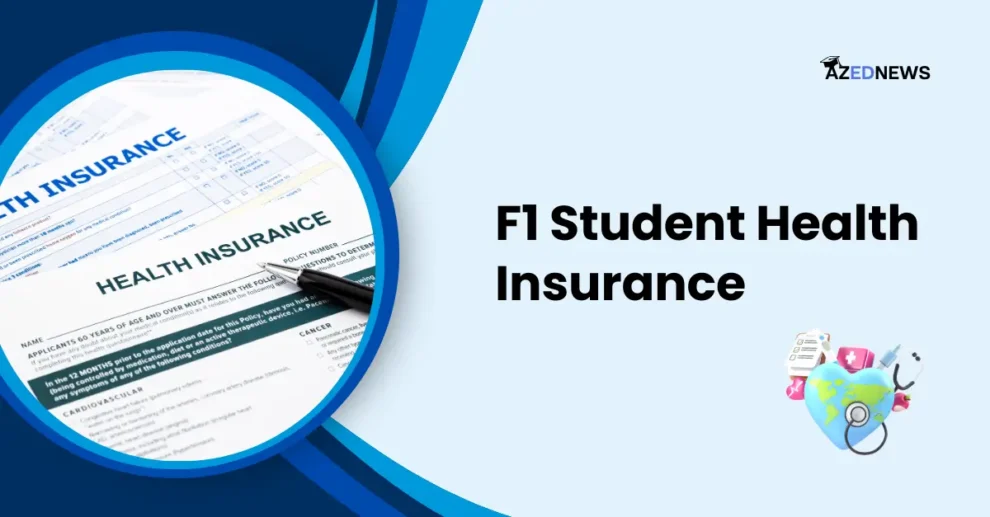Are you looking for F1 student health insurance plans? If yes then you are at the right place. Living in the United States can be expensive. It is especially true for international students on an F1 visa.
Table of Contents
They often pay for their studies with scholarships or loans. If you get sick or have an accident here, it can be expensive. But don’t worry, even though it’s tough, you can still get help.
If you suddenly get sick or hurt, and you are far from home, worrying about paying the big medical bill is the last thing you need.
So, that’s why in this article we will be discussing F1 student health insurance. Let’s get started.
Key Takeaways
- F1 visa students in the USA might not always need health insurance to get the visa, but the university they go to might require it.
- Check with your university to see if they require health insurance and if they offer a student health insurance plan.
- There are different types of health insurance plans available for F1 students, including plans offered by the university, private third-party plans, and travel insurance.
- Travel insurance is not the same as student health insurance.
- When choosing a health insurance plan, consider factors like cost, coverage, and deductibles.
- Some schools require students to have health insurance that meets certain requirements, such as coverage for mental health services and maternity care.
- The cost of your health insurance will depend on your age, location, and the coverage you choose.
Do F1 Students in the USA Need Health Insurance?
In the US, if you are an international student, the university you are going to might ask you to have health insurance. But it is not always needed for getting an F1 visa.
So, it is the university’s rule, not the law in the US. Please make sure to ask the university you are joining if you need health insurance.
How to Get F1 Student Health Insurance in the USA?
To get the F1 student health insurance for studying in the USA, you need to follow these steps:
- First, check if your college has health insurance for students.
- If they do, find out if it is included in your tuition or if you need to pay separately.
- See if you qualify for any special insurance plans that let you opt out. If not, ask for a waiver form.
- If your college does not offer insurance, look for companies that provide it for international students.
- Compare the benefits and costs of the college plan with the ones you find from other companies.
- Choose the plan that fits your needs best and buy it.
Types of Health Insurance for F1 Students in the US
Before you pick medical insurance for studying in the USA, it is important to know your options well. Your main choices include:
1. Health Insurance from your Country of Origin
This type of health insurance might be the cheapest for international students in the US, but it is not the best. The problem with these insurance plans is that it can be hard to get money back when you need to pay for medical care.
If you are an international student and you bought health insurance from a company in your home country, it might be tough to get the money from the insurance company in your home country.
Even though the insurance might help with big medical bills, you might still have to pay a lot of money upfront for smaller things like going to the doctor etc.
2. The Healthcare Center at Your University Offers a Major Insurance Plan
American universities often offer insurance plans for international students. These plans usually have two options: a Basic Plan and a Complete Plan.
The Complete Plan covers all medical expenses, from serious accidents to treatment for the flu virus. It even covers visits to the health center on campus.
However, these plans can be very expensive and might cost you a lot of money.
3. Private Third-Party Insurance
This health insurance plan from ISOA is one of the best options for international students studying in the USA. It offers great coverage at a reasonable price.
Most students in the US prefer this plan, and it covers almost all top universities in the country. You can get the Compass Silver plan for just $31 a month.
This is what many US students choose. It is a small amount to pay for such good coverage.
However, keep in mind that while the deductibles are low, you might still have to pay a bit for basic medical care. Overall, it is a great choice for student health insurance.
4. Basic Plan of the University plus Third-Party Private Insurance Plan (ISOA)
This is the best health insurance for students in the USA. It will cover your medical bills and save you a lot of money.
If your university offers a basic plan, sign up for it along with private insurance from places like ISOA.
Then, you can use private insurance for big issues and the college plan for smaller ones.
6 Best Health Insurance plans for F1 Students living in the US
Here are six of the best health insurance plans for international students studying in the USA:
- Patriot Exchange Program
- ExchangeGuard
- Student Health Advantage
- Student Secure
- Navigator Student
- Study USA
Health insurance is really important when you are studying in the US, especially for money reasons.
So, it is smart to check out different health insurance options and pick the one that fits what you need the best.
When Should F1 Visa Applicants Get Health Insurance?
You can buy health insurance for students as soon as you arrive in the United States, or even before you leave.
Websites like Insubuy compare different options for you. Depending on the plan you choose, your coverage can start the day after you buy it.
Why Can’t You Just Use Your Travel Insurance?
Your travel insurance for the US is different from the international student insurance you need for an F1 visa.
Travel insurance is for short trips and does not cover as much as student health insurance.
Your travel insurance is protection for you and for your things during your journey from your home country to the US.
Student health insurance, on the other hand, is to help pay for any medical costs while you are studying and living in the United States.
Health Insurance Options for Foreign Students in the US
When you are searching for F1 student health insurance options in the USA, it is important to also check the rules of your school to see if they have any specific requirements. Here are the main types you can choose from:
1. Mandatory Group Plan
Some schools in the US have their health insurance plans that you must get. Here is what you need to know about them:
- They usually add the cost to your tuition automatically.
- These plans can be more expensive than buying your own.
- But they cover more things, like maternity care, mental health, and pre-existing conditions without waiting. They also include wellness and preventive care.
2. Mandatory Group, with the option to Waive
Some schools have a health insurance plan that all students must have, but they allow you to choose your own if it is good enough.
To see if your plan is okay, they give you a form to fill out. It is not too long, just two pages. You and your insurance company both need to sign it.
3. Optional Plan
Some schools in the US do not make you get a specific insurance plan. You can choose whichever plan you want.
If your school lets you pick your own plan, do not just go for the cheapest one. Please look at a few different plans and choose the one that offers the most services.
F1 Student Health Insurance Requirements in the USA
If your school has a waiver form, you will need to get insurance that meets these requirements:
- Make sure your policy covers at least $50,000 in total.
- Your deductible should be low, so you do not have to pay much out of pocket.
- Your insurance must cover mental health services too.
- Female students who need maternity coverage. This should cover most of the costs.
- If you have a condition like diabetes, your insurance should cover it.
- There should be coverage for bringing your body home if something happens to you while living in the United States.
What Determines the Cost of Your F1 Student Health Insurance?
The cost of your F1 visa insurance depends on where you live, how old you are, and what coverage you need.
- Where you live affects how much you pay. Prices can be different depending on the state or county.
- Your age also matters. Older people usually pay more for health insurance.
- The coverage you choose is important too. You need to decide how long you want the insurance for and what you want it to cover.
Health Insurance Options For F1 Students After Graduation
If you plan to stay in the US after finishing school, the kind of health insurance you need will depend on your residency status.
If you switch to an H-1B Work Visa, you will need H-1B compliant health insurance. First, you will have a short-term plan.
But later you can switch to a long-term one after six months on the visa. Many times, employers in the US offer health insurance.
If you qualify for Optional Practical Training (OPT), you will need to keep your current plan. You cannot switch if you have insurance from your school.
Health Insurance for International Students on OPT
If you are on Optional Practical Training (OPT), your school’s insurance would not cover you anymore. So, you will need a different plan. This is not any different from regular student insurance.
- If you have a school insurance plan, you will need to find a private company for OPT coverage.
- If you had optional insurance, you might continue with it during OPT. You can ask your insurance company for help.
- Your employer might offer group insurance. You can ask them for more details about it.
How To Get Dental Insurance for International Students in the USA?
Not all student insurance plans include dental coverage. So, you might need to get an extra dental plan. You can add it to your existing one by paying a bit more each month, or get it separately.
If you get it separately, it works like regular health insurance. You pay a monthly fee, and they help with the costs if you need dental care.
Dental insurance usually covers check-ups, emergencies, and basic services like fillings or cleanings. For bigger things like root canals, they might cover half of the cost.
Does F1 Student Health Insurance Cover Medications, Eye Checks, and Glasses?
Most F1 student health insurance plans cover prescription medications. If you are not sure, you can check the policy details or ask the insurance company.
Usually, you pay for the medicine first, then you can get reimbursed by the insurer. There are also many over-the-counter medicines, like cold medicine, available at drugstores in the US for reasonable prices.
The basic plans might not cover eye check-ups or glasses. But you can often add this coverage by paying a bit more each month. This also depends on your insurance company.
Is There Health Insurance Coverage for Dependents?
Yes, some schools provide health insurance for students’ spouses and children. But, if your school only offers mandatory insurance without a waiver, you have to go with their plan, even if it is expensive.
If you can choose your coverage, you can get an F2 Visa health insurance plan. It gives you more choices for your dependents’ coverage.
F1 Student Health Insurance Summary
| F1 Student Health Insurance | Description |
| Mandatory or Optional | Depends on the School |
| Cost Factors | Location, Age, Coverage |
| Types of Plans | Mandatory Group, Optional Group, Optional |
| Mandatory Group Plan Waiver Requirements | Minimum Coverage ($50,000), Low Deductible, Mental Health Coverage, Maternity Coverage, Pre-existing Condition Coverage, Repatriation Coverage |
| Where to Buy | School or Private Company |
| When to Buy | Before Arrival or After Arrival in US |
Frequently Asked Questions
1. Is purchasing health insurance through the university required?
Some universities might make you sign up for their insurance plan. So, before you start using the plan, please make sure to ask your university about it.
2. What is covered by the international students’ health insurance plan?
The type of insurance you have affects what it covers. But, the basic coverage usually includes:
1. Doctor visits when you do not need to stay overnight at the hospital.
2. Hospital stays when you need to spend the night for treatment.
3. Emergency dental care.
4. Prescription medicines.
5. Medical tests to diagnose health issues.
3. What is the price of health insurance for F1 students studying in the US?
The price of health insurance for F1 students can vary. It is based on different factors like how long you will study and what type of coverage you choose. On average, an annual insurance plan might cost you between $500 and $1,000.
4. What are the best health insurance plans for F1 students in the USA?
There are different health insurance plans available for F1 students in the USA. Some of these plans include ExchangeGuard, Patriot Exchange Program, Student Secure, Student Health Advantage, Study USA, and Navigator Student.
Conclusion
F-1 visas for international students in the USA do not always require health insurance, but most schools require it. Please check with your school to see if they have a health insurance plan you must buy or if you can choose your own.
There are three main types of health insurance plans for F-1 students:
- Mandatory group plan
- Optional plan
- Basic school plan with private insurance
When choosing a plan, you must consider your budget and what you need it to cover. Here are some things to consider:
- Minimum coverage of $50,000
- Low deductible
- Mental health services
- Maternity coverage (if female)
- Pre-existing condition coverage (if applicable)
- Repatriation coverage (to bring your body home if you pass away)
Your F1 student health insurance costs will depend on your age, location, and the coverage you choose. You can buy health insurance as soon as you arrive in the US or even before you leave. Please make sure to read all the related documents carefully before choosing your F1 student health insurance plan.












Add Comment